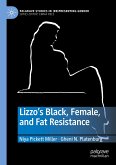Celebrated musician and entertainer Lizzo wowed audiences and left many "feeling good as hell." Notwithstanding her collective-fat, Black female- identity she catapulted into mainstream success while redefining the social script for body size, race, and gender. This book explores a tale of two narratives: Lizzo's self-curated, fat-positive identity and the media's reaction to an unabashedly proud fat, Black woman. This critical analysis examines how Lizzo challenges fatphobia and reconstitutes fat stigmatization into self-empowerment through her strategic use of hyper-embodiment via social media, and the rhetorical distinctions between Lizzo's self-curated narrative via social media and those offered about her in print media. In part, Lizzo's bodily flaunting is argued as a significant rhetorical act that emancipates her identity of fatness and reframes the negative tropes of (fat) Black women typically curated in American culture.
Bitte wählen Sie Ihr Anliegen aus.
Rechnungen
Retourenschein anfordern
Bestellstatus
Storno








